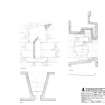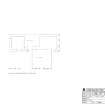Aberuthven, St Kattan's Chapel
Church (17th Century)
Site Name Aberuthven, St Kattan's Chapel
Classification Church (17th Century)
Alternative Name(s) Montrose Mausoleum; St Catan's Chapel; Abruthven
Canmore ID 25957
Site Number NN91NE 11
NGR NN 97340 15104
Datum OSGB36 - NGR
Permalink http://canmore.org.uk/site/25957
- Council Perth And Kinross
- Parish Auchterarder
- Former Region Tayside
- Former District Perth And Kinross
- Former County Perthshire
NN91NE 11 97329 15087.
(NN 9734 1510) St. Kattan's Chapel (NR)
OS 6" map, (1958)
A ruined church near the village of Aberuthven, supposed by MacGibbon and Ross (1896-7) to be a cell of Inchaffray, was, in fact, a parish church (Easson 1957) dedicated to St. Cathan (MacGibbon and Ross 1896-7) or Catan (Scott 1918). The existing structure is evidently late, the only architectural features being a seventeenth century belfry on the west end and two small pointed windows in the east end.
The west end of the church is occupied by the fine Palladian burial place of the Dukes of Montrose dated 1736 (Lindsay 1950), and is not accesssible.
(Included with other 15th-16th century examples.)
D MacGibbon and T Ross 1896-7; A B Scott 1918; I G Lindsay 1950; D E Easson 1957.
Generally as described, but, contrary to Lindsay (1950), the west end of the church is occupied by a modern burial vault, not the Palladian vault, which is at NN 9735 1509 (Mausoleum on OS 25" map).
St. Kattan's Chapel is the generally accepted name locally.
Visited by OS (R D) 3 August 1967
Abruthven (Dunblane) was granted by Gilbert, Earl of Strathearn, to Inchaffray on its foundation c. 1200, and confirmed to the uses of the abbey by Bishop Abraham c. 1211, the parsonage remained annexed while cure was a vicarage perpetual.
I B Cowan 1967.
St Kattan's Chapel is situated on the edge of a terrace above and to the W of the Water of Ruthven. The interior of the building has been divided into private burial lairs, that occupying the W end having a slate roof.
Despite the building being heavily overgrown by ivy, several phases of modification and reconstruction can be identified. The oldest surviving fabric comprises two small lancet windows in the E gable; formed of large blocks of sandstone, these are splayed internally, with lintelled heads, the lintel of the S window being set at a lower level than that to the N.
The present internal ground level is considerably above that of the original floor, and a small aumbry in the N wall is now partially buried. The Montrose vault, which stands on the line of the S wall, is inaccessible.
Visited by RCAHMS (JRS, IF), 25 October 1995.
EXTERNAL REFERENCE:
SCOTTISH RECORD OFFICE
See paper catalogue, 30 pages of references, 25.4.2001.


























































